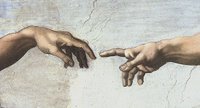
Question:
Why did Brigham Young teach that Adam is “our Father and our God” when both the Bible and the Book of Mormon (Mormon 9:12) say that Adam is a creation of God (Journal of Discourses, Apr. 9, 1852, vol.1, p.50)?
Answer:
Dear Brother A____:
Thank you for your question.
Adam's body is a creation. Adam the individual, the spiritual being is -- like you -- eternal and uncreated.
You probably understand the answer to the first part of your question. We know Adam to be our father because he is the first father, the father of our mortal selves.
As to the second part, the definition of God is: The one who holds all knowledge, all priesthood, all truth, all righteousness. Adam, as a repentant, righeous man, as a prophet, as a participant in the creation, and as a holder of all the priesthood keys that have ever been exercised on this earth, appears to fit this definition.
Nevertheless, the Savior Jesus Christ is the God we worship. And our Savior asked us to worship His Father. (Likewise, Adam taught his posterity to worship the Savior and the Father.) So in obedience to these principles, we do as we're commanded and pray only to God the Father, in the name of Jesus Christ.
Prophets and other righteous beings are to be honored and respected; the Father and the Son and the Holy Ghost are to be worshipped.
The state of Godhood -- the eternal priesthood -- is available to all righteous, repentant followers of Jesus Christ, our Savior. Adam is one whose calling and election have been made sure, so while it's probably premature (or prescient?) of Brigham Young to describe Adam as a God, it's unlikely to be inaccurate.
We hope this answers your question. If you have further questions, or would like to continue discussing this one, please write again.
Blessings,
--The Practical Mormon
